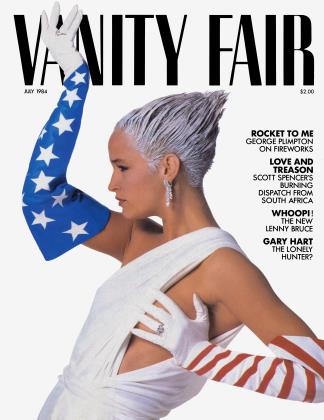Sign In to Your Account
Subscribers have complete access to the archive.
Sign In Not a Subscriber?Join NowDEALS III
Virgin Records' Richard Branson is taking to the air...to claim Sir Freddie Laker's title, "People's Millionaire"
O UMMER being the silly seaOson, it's time to talk about Britain's latest pretender to the title of People's Millionaire, unclaimed since the bankruptcy of Sir Freddie Laker's airline in 1982. Just thirty-three, recording mogul Richard Branson has added cut-price Virgin Atlantic Airways to his multimilliondollar Virgin empire of record companies and record shops, films, a Virgin Island, gay nightclubs, and Boy George. As Virgin Atlantic is fully booked for the high tourist season, through September, Branson's imitation Laker looks likely to succeed.
"Even if the airline loses money," Branson says, "I can keep my planes over the Atlantic for a year on the profits from Culture Club alone. And if the major airlines attempt a price war, well, the Virgin Group's turnover last year was £ 130 million" (about $184 million).
That defiance is typical of Branson's management style. A man of medium height, with virile gestures, a taurine head, sharp, almond-shaped eyes, and the refined diction of an English-public-school boy (which, in fact, he is), Branson exudes the crass energy on which he has built his career. He began, on quitting school in 1967 at sixteen, by writing and publishing The Student. At the time, a paper devoted to the cause of teenage rebellion looked like a surefire business. It was not. "Our finances seemed to have been run largely along lines devised by Timothy Leary," Branson now concedes with a smirk. But he learned how money could be lost pandering to the youth market; he was determined to know
how it could be gained. And in the London of the late sixties, Branson sensed that despair, not enthusiasm, would inform the anthems of the seventies.
In the early seventies he opened a mail-order record company, which promptly fell afoul of British customs and was fined $141,000. At the same time, he also founded Virgin Records on one of the narrow streets ofNotting Hill Gate, then a black London slum of "model housing" and warehouses. That Branson's empire should have begun (and still reside) in the dull haze of what was once London's equivalent of Haight-Ashbury strengthens one's belief in life as scenario, for the Virgin Group is run by a man whose modus operandi most closely resembles that of The Magic Christian.
"You can't tell me it's like they say, that he started Virgin Atlantic just because there was a market to be exploited and the big airlines were planning on grabbing it for themselves," a former Virgin employee muses, fingering the diamond in his left earlobe. "It must be part of some larger cause."
The judgment is apt. Anyone who skims the London financial press knows that Branson never "deals" or "negotiates"—he has "causes." It is as if, by applying the language of sixties revolt and preserving the scruffy denim uniform, Branson has managed to maintain his image as some sort of alternative capitalist. The image is a sham, of course—but a necessary one. It has helped him stockpile the largest private fortune made in Britain through industry by anyone of his generation.
In the three years after he created Virgin Records, Branson became powerful enough to worry Britain's recording-industry giants. As he cast about for a formula to entice his country's dole-dominated youth, Branson hit on the ideal excitant—a mixture of nihilism and sex that recalled the early Rolling Stones but left out the attendant glamour. He signed the Sex Pistols despite the real threat of government censorship. To enhance his own appeal, Branson billed himself as the only recording executive daring enough to promote Sid Vicious and Johnny Rotten.
Branson's special power as a promoter derives in part from the fact that he half-believes in what he sells. But more important, he regards the cupidity of the British public as a national asset well worth exploiting. He is also said to be the best contract writer in the business.
Since he was contentious and well informed, his shrewd pronouncement that Virgin would handle subversive music lured many a new band to send its tapes to him first. His relations with those he put under contract became half-avuncular, halfdemagogic. Being a dominant personality, he was obeyed; being young like his clients, he
was loved and trusted. Branson is widely thought, for instance, to have taken as much as 90 percent of what the Sex Pistols grossed during their brief career. "If you are an unknown," says a onetime financial adviser to the band Genesis, "doing business with Richard is like going to a slave auction. ' '
Such comments and stories are traded like baseball cards by both Branson failures and successes. There is one about Mike Oldfield, who delivered to Branson a tape he had recorded as a sixteen-year-old, then watched as Virgin reaped huge profits when "Tubular Bells" became the theme of the movie The Exorcist and a Top 40 hit.
Branson prefers to say little about how he conducts his business nowadays. The rumor about his floating the Virgin Group on the London Stock Exchange late this summer—a prospect which could yield him as much as $568 million—is greeted with a boyish "shucks." And although Branson's private conversation does not ooze sixties treacle, he does try, perhaps unconsciously, to hang on to the turbulence and innocence, however ersatz or shallow, that marked his beginnings. That is and remains the secret of his success .
Kenneth McMahon
 View Full Issue
View Full Issue












Subscribers have complete access to the archive.
Sign In Not a Subscriber?Join Now